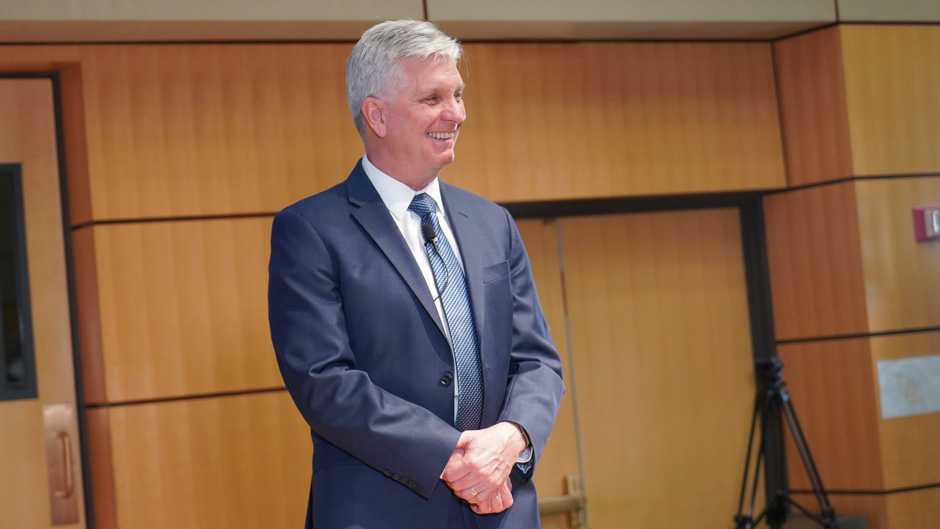In a presentation on April 19, Christopher Waller, one of seven board members of the Federal Reserve, outlined the debate over central bank digital currencies (CBDCs), a digital form of central bank money, and fielded questions on monetary policy from the audience in the Storer Auditorium at the University of Miami Patti and Allan Herbert Business School.
Waller’s lecture was the first in the business school’s Henry Family Endowed Leader Lecture Series in Economics.
While the Fed continues to assess the risks and benefits of pursuing and implementing a CBDC, Waller left little doubt that, in his estimation, the U.S. central bank would be ill served to do so. Waller took office in December 2020 to fill an unexpired term. Members are nominated by the president, confirmed by the U.S. senate, and can serve a full term of 14 years.
David Andolfatto, professor and chair of the Department of Economics, introduced Waller as an “economic luminary whose views are highly sought after by fellow bankers, the business community, and the press.”
Waller explained that his perspective and comments stemmed from the Fed’s published paper, “Money and Payments: The U.S. Dollar in the Age of Digital Transformation” and a speech he gave on the subject of CBDCs in general, and about the potential benefits and risks of a U.S. CBDC.
An esteemed university professor for many years, Waller donned his teaching hat to “demystify” what he said was a timely topic that reflects the movement from a world of physical currency to one of digital currency.
“CBDCs are being contemplated all over the world by central banks,” Waller said. “But there’s a tremendous amount of confusion of what this is, and the confusion arises because people don’t understand how payments are made in the U.S.”
Waller questioned a number of the purported benefits—driving down banking costs, encouraging more people to have accounts, and increasing the speed of transactions—of moving to a system that would have the central bank competing with commercial banks by offering digital accounts.
“In the U.S., don’t have government agencies that go out and compete directly with private sector firms,” he said. “As much as you might like electric cars and how noble this is, we don’t have the U.S. government saying we should build electric cars and drive down the price of the Tesla.”
The current system continues to operate quite efficiently, he asserted.
Banks are trusted record keepers that control the database of financial transactions, he explained. They’re trusted to do this because they are “pretty well-regulated” and employ auditors that ensure that they are trusted. Pursuing this new innovation would further tax an already overburdened financial regulating system, according to Waller.
“There’s just so much innovation going on already—we can’t keep up with it. This is the whole fight right now between the Securities and Exchange Commission and all the crypto exchanges,” he said. “The idea that there’s too little innovation is not a convincing argument at all.”
In his concluding comments, Waller summarized his stance.
“What major market failure exists that only a retail CBDC can solve?” he asked. “It’s a solution in search of a problem, but what is the problem?”

